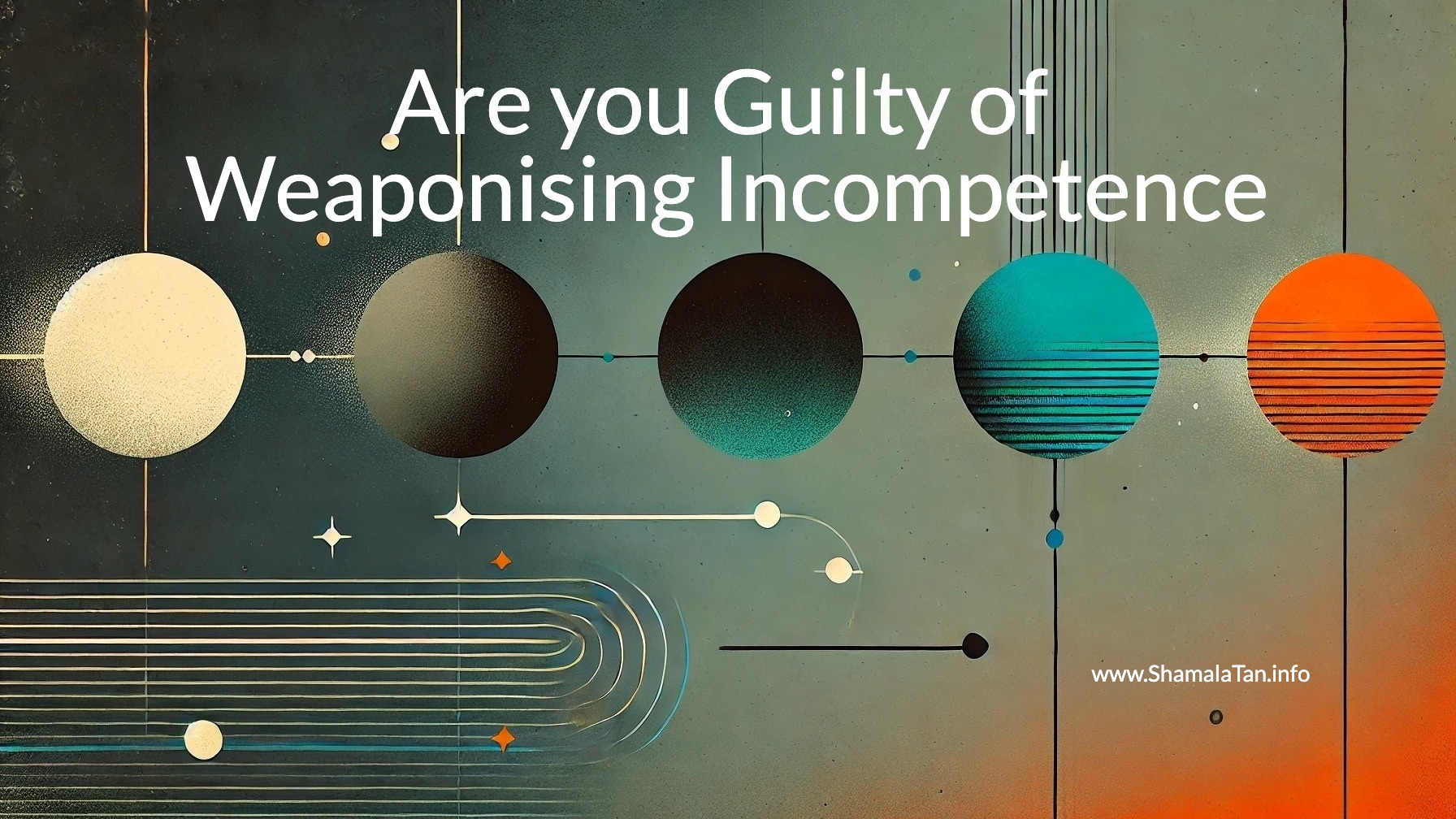Are You Guilty of Weaponising Incompetence?

Weaponised incompetence happens when someone pretends they can’t handle a task—or does it so poorly that someone else has to step in and take over. Whether it’s a friend dodging responsibility, a family member refusing to share household chores, or a colleague dumping extra work on the team, this behaviour creates an unfair balance. Over time, it breeds resentment, exhaustion, and frustration for the person picking up the slack.
The problem? It’s so normalised that many don’t even recognise it’s happening. Let’s explore how weaponised incompetence shows up in our daily lives and what we can do to break the cycle.
Understanding Weaponised Incompetence
Weaponised incompetence is not about a genuine lack of skill or knowledge but about the deliberate avoidance of effort. It can manifest as exaggerated claims of inadequacy, intentional mistakes, or repeated requests for help with simple tasks. Over time, the person on the receiving end of these behaviours may feel frustrated, exhausted, or undervalued.
This behaviour is often normalised because it hides under the guise of “needing help” or “being unsure,”making it challenging to confront without feeling overly critical or harsh.
How It Shows Up in Different Areas of Life
1. In Friendships:
Weaponised incompetence in friendships often looks like one person consistently relying on others to make plans, organise group events, or even manage emotional labour. For example:
A friend always says, “I’m terrible at planning—why don’t you decide?” They show up late or unprepared for shared activities, leaving someone else to fix the gaps. Over time, this imbalance can make the more reliable friend feel taken for granted. What started as casual support becomes an unfair expectation.
2. In Families
Weaponised incompetence is especially common in families, where traditional roles often come into play. You might see:
A partner saying, “I can’t cook like you do,” to avoid cooking altogether.
A parent doing all the chores because the kids claim they “don’t know how” to do it right.
A family member refusing to learn a simple skill, like setting up a phone or managing online payments, leaving the task to someone younger. While helping each other is part of family life, a consistent refusal to contribute fairly can lead to burnout and resentment.
3. At Work
In the workplace, weaponised incompetence is both subtle and damaging. It might look like:
A colleague who “doesn’t get it” and keeps making mistakes, forcing others to redo their work.
A manager who avoids tough decisions by passing them to the team or delaying them altogether.
A team member who’s always “too busy” to take on responsibilities, leaving the rest of the group to pick up the slack. When this behaviour goes unchecked, it affects morale and productivity, leading to burnout for those who consistently pick up the pieces.
Why Do People Do It?
There are several reasons behind weaponised incompetence:
Avoidance: They don’t like the task or don’t want to put in the effort. Entitlement: They’ve become used to others stepping in to handle things for them.
Power Play: For some, it’s a subtle way of maintaining control—by shifting responsibilities, they dictate who does what.
Fear of Criticism: By pretending to be incapable, they avoid judgement or accountability if something goes wrong.
Breaking the Cycle
Weaponised incompetence can be frustrating, but addressing it doesn’t have to be confrontational. Here’s how you can handle it:
Recognise the Pattern Pay attention to when someone consistently avoids certain tasks. Are they genuinely struggling, or is it a pattern of “forgetting” or “not knowing”?
Speak Up
It can be uncomfortable, but clear communication is key. In friendships, you might say: “I’ve been planning a lot of our meet-ups lately. Could you take the lead this time?”
In families or work settings, it could sound like: “It’s important that we split this fairly. Can you handle this part moving forward?”
Offer Guidance, Not a Free Pass
If someone genuinely needs help, offer to teach them once—but don’t take over. For example:
“I’ll show you how to do this laundry cycle, but next time it’s yours to manage.”
“Here’s a guide to the project steps—let me know if you have questions, but I trust you’ve got this.”
Set Boundaries
If someone repeatedly refuses to step up, it’s okay to enforce boundaries. Let them know their actions (or lack thereof) have consequences: “If you don’t handle your part of the work, I can’t keep picking up the slack.”
Why It Matters
Weaponised incompetence erodes trust and fairness in any relationship, whether it’s with friends, family, or colleagues. By addressing it head-on, you not only protect yourself from burnout but also encourage others to take accountability.
It’s not about being harsh—it’s about creating a balance where everyone shares the load equally. When we stop normalising this behaviour, we open the door to healthier, more equitable dynamics.
For more tips on improving relationships and building self-awareness, enquire about Shamala's therapeutic coaching sessions. email: info@shamalatan.com

